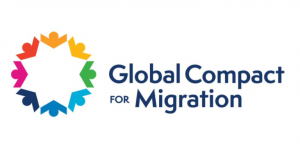 The Global Compact for Migration for UN member states is more or less a globalist project where all signatory states declare their will to abolish the current different categories of migrants in order to declare migration a blanket “human right.”
The Global Compact for Migration for UN member states is more or less a globalist project where all signatory states declare their will to abolish the current different categories of migrants in order to declare migration a blanket “human right.”
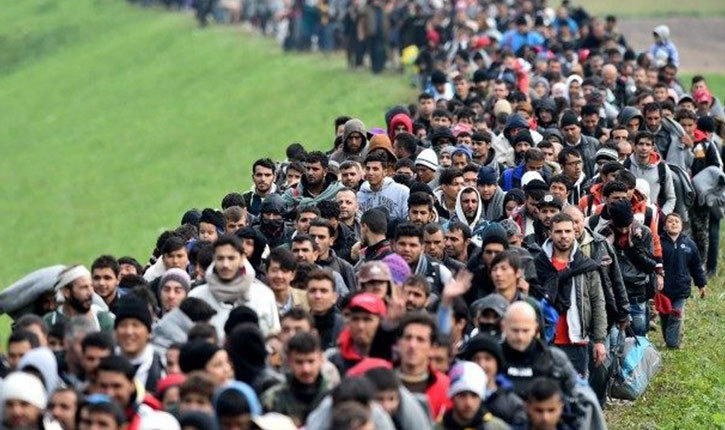
FreeWestMedia The only leaders unwilling to go along are US President Donald Trump and Hungary’s Prime Minister Viktor Orban. They have both declared that they would not sign the Global Compact.
German Alternative for Germany (AfD) MP Markus Frohnmaier said: “If there had not been the AfD in the German parliament, no other political force (in Germany) would dare to criticize this monstrous document.”
“This document will enforce migration to Europe. It is open-border propaganda on steroids,” says Frohnmaier. The young politician is part of a European alliance of politicians of sovereignist conservatives who have been organizing the political opposition against the “crazy concoction” as Frohnmaier calls the final draft of the Global Compact.
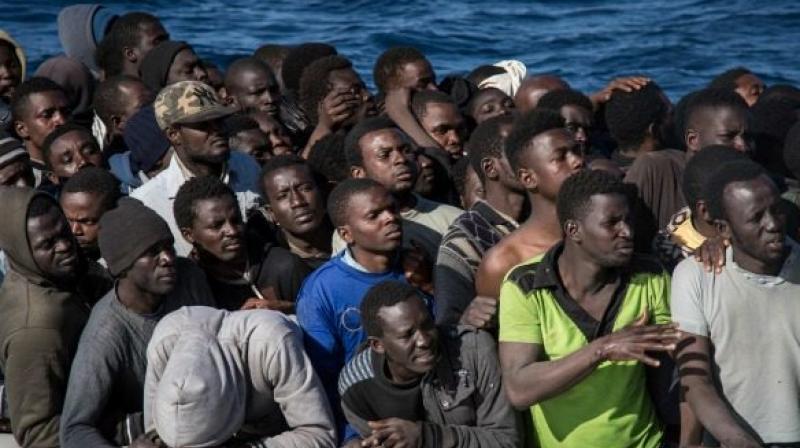
Indeed, if this international agreement is implemented by signatory states, it practically means an end to controlled migration and borders as we we know it. The agreement does not distinguish between refugees and migrants anymore.
Thus even illegal migrants can no longer be deported. In fact, it will be the end of the very notion of an “illegal migrant”. Illegal border crossings will no longer be considered a crime – since migration will be considered to be a “human right”.
The draft for the Global Compact took 18 months to finalise and was approved in July by 191 UN member nations except the United States, which pulled out last year saying it was “inconsistent with US immigration and refugee policies”.
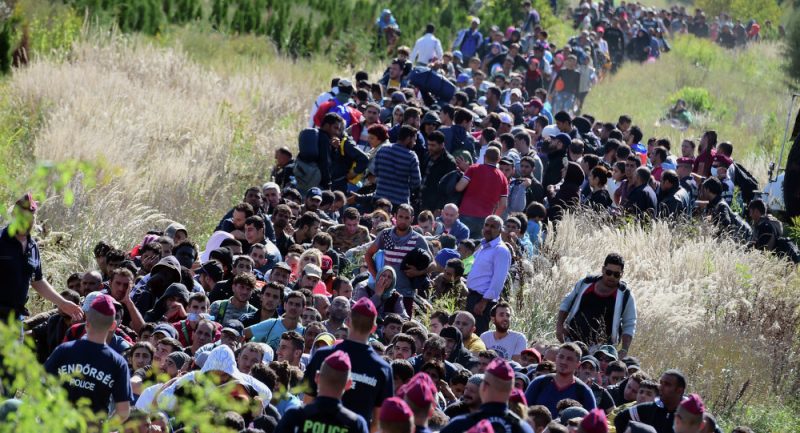
Hungary resisted as well. “This document is entirely against Hungary’s security interests,” said Hungarian Foreign Minister Peter Szijjarto. He described the Compact as an “extreme” measure, which was also “biased and facilitated migration”.
Peter Szijjarto is succinct in his condemnation: “Its main premise is that migration is a good and inevitable phenomenon. We consider migration a bad process, which has extremely serious security implications.” Frohnmaier agrees: “This document is a smoke screen. It describes migration as a pure enrichment for Europe and totally ignores any negative effects on our societies.”
The starting point for the Global Compactwas a summit on flight and migration that took place under the aegis of the UN in September 2016, with Barack Obama issuing the invitation.
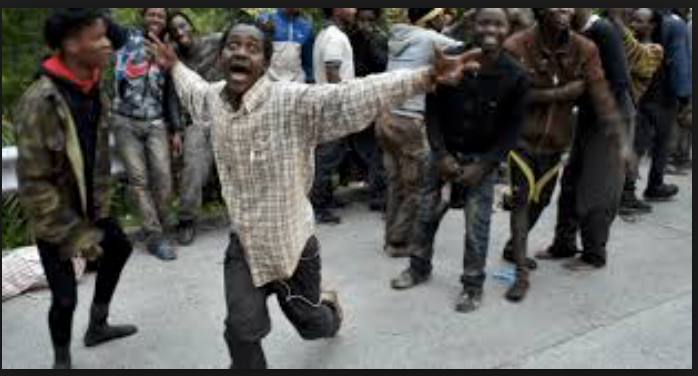
The Global Compact for Migration, which essentially comprises 23 goals, claims to focus on protection, the rights and improved living and working conditions of migrants and their families.
The Compact aims to create a global framework for managing migration, called a “non-legally binding, cooperative framework” to encourage “international cooperation among all relevant actors on migration, acknowledging that no state can address migration alone, and upholds the sovereignty of states and their obligations under international law”.
But the term “non-legally binding” has riled critics such as Frohnmaier. For him such terms are just “soft liberal poetry, a chill pill for those who do not agree with the scandalous content of the Compact”.
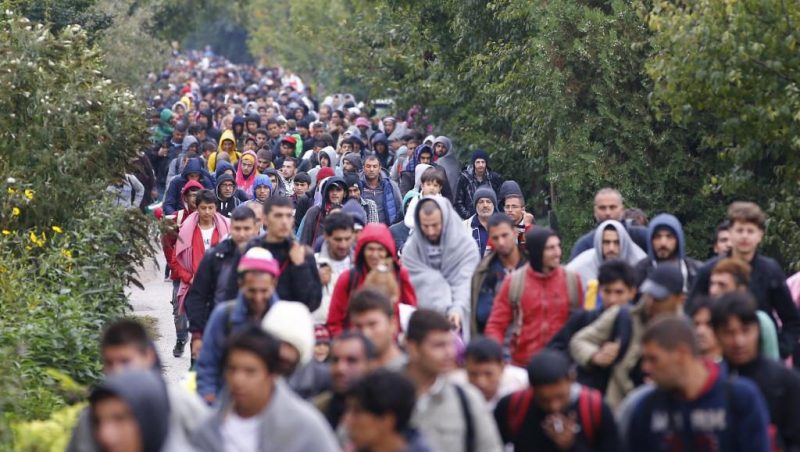
The circle of opponents is growing day by day. Austria’s vice chancellor and leader of the conservative Freedom Party, Heinz Christian Strache, said in an interview with the Austrian daily Kronen Zeitung: “Migration should never become a human right.”
Italian Interior Minister Matteo Salvini from the anti-immigration Lega, may not be signing the controversial document either.
The Inter-Governmental Conference to Adopt the Global Compact for Migration will take place in Marrakech, Morocco on the 10th and 11th of December. Most of the European states will sign the document there.

Australia has not signed the ‘agreement’.
Nobody has signed on to it because it doesn’t come up for a vote until Dec. I haven’t heard Australia saying they won’t sign it.
President Trump. Put the U.S. military on the Mexican side of the border. Several miles away from the U.S. border. Mexico, the UN and any other country that doesn’t like it be damned. This is an invasion pure and simple and must be stopped by all means necessary. Anyone who thinks Mexico is a friend or ally of America is either stupid or delusional.
This article implies that Israel signed this “international agreement.” Did they? If they did, I doubt they’ll apply it to themselves. Or that anyone will pressure them to accept African migrants.
GC, the final vote on it isn’t until December. Stay tuned.
An invading army thousands strong is being puked up from the depths of the South American shithole of Honduras. Trump needs to place our military on the border with orders to shoot. The Mexican police couldn’t contain them.
God knows how many Muslum jihadis have snuck into this group.
The military will be there if it is not stopped before our border. Count on it.
I wish I could feel that the military being on the border will help the situation. They won’t be allowed to shoot to kill border breakers. Sorry, but I think that’s the only way to stop them.
Not at all. 10 or 20,000 thousand armed soldiers on the border should be enough a deterrent. Of course that won’t deter the terrorists among them who are probably armed from trying to break through and the soldiers will deal with them.
I believe our now EX Prime Minister Malcolm Turnbull co-authored this Global Compact without any mention to the people of Australia and I also understand, though not announced that our now EX Foreign Minister signed it before stepping down. All without a Mandate from the people. So much for Australia’s Sovereign Borders. Malcolm Turnbull et al have done a lot of damage to Australia, much of which we here in Oz probably have not heard about yet before they were ousted. Good riddance to the Agents of the UNelected Elites. A right pair of UN STOOGES!
THATS NOT ALL:
I suspect Turnbull okayed Australia’s 5 eyes spying on candidate Trump in 2016. Obama and Hillary got the other partners of the 5 eyes esp GCHQ (UK), Australia, and maybe NZ and Canada to spy on the Trump campaign. Remember John Key, Obama’s golfing buddy resigned on 5 December 2016. a month after Trump was elected. The UK boss of GCHQ Robert Hannigan resigned too on Jan 23 2017 just after Trump was inaugurated.
Alexander Downer was involved in the UK via one of his staff Erika Thompson. …who just happened to be an Australian intel officer and assistant to Downer.
They inveigled George Papadopoulos into their scheme. Papadop was naive and stupid and fell for it. Now he gets a jail sentence
Remember when Turnbull phones to congratulate Trump, he hardly congratulate him before he asked Trump whether the deal Obama made with Turnbull to take the Nauru fake-ugees would still hold. Trump was furious. At any rate the US has now rejected most of them
Then to add insult to injury, at last years Winter Ball, Turnbull did a skit mocking Trump. It was recorded. Imagine that- an Australian PM mocking an ally? It was disgusting.
I suspect Turnbull was also rolled because of it cmes out that he ordered Australia’s 5 eyes to spy on an ally, the fit will hit the shan. And its going to come out. Papadop has been tweeting non stop about it
A very good impression of a worthless piece of shit doing an impression of a real leader..
Just shows himself up for what he is..
I guess if there is any good coming out of this it shows why Yahweh the true God separated people into tribes at the Tower of Babel. Oh we’ll also get to see which nations want to be swamped by muslims and which nations will tell the UN to get lost and pound sand.
Trump and Orban: two sane voices in a world full of raving PC lunatics. This will go down in history as the most dangerous and failed social experiment ever.
Keeping my fingers crossed that Salvini will live up to his much lauded promise as well.
Prepare for big Crisis and 3 WW. New WWO plans to implement changes All over the world.
Hope Poland government is clever and don’t sign this.
DO NOT be fooled. This is about the destruction of the West and the Right, er White race. Somebody wants mankind plunged into darkness by race so the only light you’ll see is the man of sin.
He will plunge the world into it’s final war. The dreaded TURD World War.
The USA should only sign compacts with the Visegrad Group of Free Nations. Free of islamists is the greatest good !
yeah turning the 1st world into the 3rd world will save the world…lefties(commies) and muslums(jihad/sharia-believer) together to destroy the white culture/ethnic… this planet is doomed …
Only governments run by fools will sign this ‘deal with the devil’ in terms of ending their control of their countries independence from global rule by despots and traitors like merkel, macron and so on. Hopefully more and more of the 193 countries will not sign this demonic, global compact for migration. All support for President Trump to build the wall and to go on to stop the mass mob coming up through Mexico.
Cat… ” Only governments run by fools ” That just about sums up 99% of the worlds governments..
Criminals, traitors and fools….
Yay to Trump and Orban. Screw the globs theyre just creating more mayhem, increased crime and wars. Do they seriously think people who have worked all their lives will sit back and watch undesirables just march in and demand what they have. Nobody likes a squatter or a bludger. The only result will be an increase in bloodshed, poverty and the sale of weapons as people tool up to protect themselves
President Trump better make good on his recent promise to send in the U.S. military to the Border if the Mexican government cannot or will not stop the Caravan invasion!
https://www.breitbart.com/news/migrant-caravan-swells-to-5000-resumes-advance-toward-us/
Agree. These bleeding heart liberals haven’t a clue as to what they are really supporting. If one thinks there is an affordable housing shortage now, just wait till millions more come here. Just wait till they take their job or rape or murder their children. The leaders of these invading countries aren’t stupid. They are emptying out their prisons, their mental hospitals sending us their uneducated and their drug dealers and gangs. Just wait till the garbage and poop on the sidewalk isn’t just in the big city any more but comes to one of their cities! Then they will be singing a different tune. Just wait till the Medicare and Medicaid dollars are spread so thin that your co pays sky rocket and the lines at clinics and hospital are so long that you may just as well stay home and die. Just wait till your children get put in classrooms that are so large that no teacher could teach. Forget about collecting your Social Security benefits as what you paid will go to the illegals.. This invasion is suicide on many levels and only an idiot won’t admit it.
So sick of BROWN PEOPLE INVADING WHITE LANDS.
it’s a human right for each nation to defend itself from muslim s-holers, f the un
If migration is an undeniable human right, I wonder how many people will willingly migrate to Islamic majority countries (most of which are unstable and filled with political, ethnic, tribal, and religious violence) or poverty stricken countries or countries that are failed states, or nations that are ruled by brutal iron dictators? Hey! Migration is a right. We have a right to migrate to live under a brutal dictatorship. We want to get our rights trampled on!
Is anyone willing to migrate to Mozambique? Haiti? How many people, other than Muslim fanatics, would want to emigrate to Saudi Arabia or Afghan areas that are held by Taliban or Daesh?
Wouldn’t it be a better solution to try to fix failed, failing, and unstable states so that migration wouldn’t be necessary? Then people could opt to stay in their own home countries. Failing that, we can’t take in all the refugees from failed states as that would contribute to the failure of stable societies; societies that are stable would collapse. Where would refugees migrate to then?
But that is not the goal. The goal is to destroy America and make it a “third world country” just like China. The Globalist Elite admit this is their goal in their own words. I have listened to the Videos with them saying this. They say they cannot get their Global Government UNLESS America is turned into a Communist nation.
If this passes then the UN will try and censure the US ( or send members for an investigation as they have done tomthe US before for alleged human rights violations) and I am really afraid of what will happen, ……the UN lIke censure us and possible send peacekeepers here if we try and build a wall or if we try and limit immigration and migration into our country!
LW, just today I am hearing rumors about Trump defunding the UN because they are behind the latest caravan with thousands of illegals trying to break into the US.
In America, Wonderful Donald Trump keeps us from this SATANIC ACT Against NON-Muslims.
EVERY EVIL POWER on Earth want Trump gone. Trump must be re-elected!!!
When ETHICAL, PATRIOTIC Trump no longer governs America, ALL HELL WILL BE UNLEASHED on AMERICA. Be prepared for great horrors.
“illegal migrant”. Illegal border crossings will no longer be considered a crime – since migration will be considered to be a “human right”.
Almost all of the MILLIONS of invaders to Europe so far are HOSTILE, BLACK AFRICAN MUSLIM MALES of MILITARY FIGHTING AGE.
When the GOD HATERS declare that MIGRATION will be CONSIDERED to be a HUMAN RIGHT, what they really mean is MUSLIM CONQUEST of HATED, WHITE CHRISTIANS will be Considered to be a HUMAN RIGHT.
They call it the Suicide of European Nations. It’s NOT!!!
It’s the MURDER of European Nations by our EVIL leaders.
“With Open Gates: The Forced Collective Suicide of European Nations” BEST VERSION 1080p
All I could think of during that video was, “they should shoot them, just start shooting them and they would run away, and then you can hint them down and deport them.” And “ there are so many liberal,idiots that need shooting , they are traitors to their own countries, and race”
Quran (3:56) – “As to those who reject faith, I will punish them with terrible agony in this world and in the Hereafter, nor will they have anyone to help.”
The UN, EU, OIC, George Soros and Globalist Elites are determined to ENFORCE a One World Government and One World Religion on ALL NON-Muslim nations.
Our RABID CHRISTIAN HATER LEADERS, colonized our Christian nations with Muslims to facilitate WHITE CHRISTIAN GENOCIDE. They’re determined that it will be as if our people never existed on this earth.
SATANIST WESTERN LEADERS Want to SPEED UP WHITE CHRISTIAN GENOCIDE. Hence this SATANIC AGREEMENT.
Speaking the TERRIFYING TRUTH about Islam can get innocents prosecuted and imprisoned.
Western governments and intelligence agencies are cognizant of the terrible, SATANIC things that the BLOODTHIRSTY Quran Commands to perpetrate on Non-Muslim innocents. They work night and day to hide the truth from non-Muslims.
The NEVER ENDING INVADING MUSLIM ARMIES which will Now INCREASE ENORMOUSLY UNDER this TREACHEROUS AGREEMENT, are the UN/EU PROXY ARMIES to wage daily jihad against non-Muslims and for the Planned HUGE WARS that will rage all across our nations, leaving mega millions of Christians, Jews and other non-Muslims BARBARICALLY SLAUGHTERED in the streets.
Patriotic Brit, Enoch Powell, warned that RIVERS of BLOOD WILL RUN in OUR STREETS.
Quran (3:151) – “Soon shall We cast terror into the hearts of the Unbelievers…
https://www.thereligionofpeace.com/pages/quran/violence.aspx
The Quran contains at least 109 verses that speak of war with nonbelievers, usually on the basis of their status as non-Muslims.
Some are quite graphic, with commands to chop off heads and fingers and kill infidels wherever they may be hiding.
Muslims who do not join the fight are called ‘hypocrites’ and warned that Allah will send them to Hell if they do not join the slaughter.
Well, I for one would not have minded the US signing such a compact with one small modification. It should specifically exclude Muslims from the definition of humans. Seriously folks, having the UN is akin to housing the enemy on our soil. I truly wish that during the Trump Presidency we will see the US pull out of this despicable outfit, and the UN will house itself in one of those nations that ‘Syrian’ Refugees come from. Some prime real estate will be freed up for more useful purposes than for constantly plotting against our nation, and Israel.
That’s okay, we own the UN!!!! We’re just about the only ones paying the bills.
FREEDOM is a Human Right. The UN intends the destruction of all Freedom, with it’s various “Agendas”of Control. Therefore the UN must be destroyed.
It sounds like The Barcelona declaration on steroids…
How can these lunatics be taken down??
The more I see of President Trump…the more I like him…
I liked him from the start..
I read somewhere ,, ..that Poland has taken 30,000 muslims ..
Does anyone know anything about this..
The world has gone completely mad..This has to be brought to a stop..
AM, there might be 30,000 in Poland totally, but they have refused to take more than a handful since 2015.
The problem is that 30, 0000 can so quickly turn into 300. 000 ..
they breed like termites and take over from there..
We only had a few at the beginning here in Uklamabad..
Now we’re overrun with them and they HAVE taken over through our appeasing government..
I hope Hungary will be very careful about who they take in from the European refugees fleeing this madness…There are a lot of do gooders in amongst that lot who are complicit in the destruction of their own nations…
Mr Orban would be very wise to throw them out the second they start to kick off..
In our faces …
Trump can have all the people in the republican party at the event he wants,but if he lets those sorry ,so called migrants,in this country he is toast in the 2020 election.Also that will show his true colors.
You are so right. He needs to get rid of Paul Ryan. He is a Traitor. He is not a Republican in any sense. He is a Democrat Plant in the GOP. I detest that man.
Paul Ryan is leaving in Jan.
Legal migration which is governed by the laws of the target country is a human right. Kick the UN out of America. China has room.
Punish sedition. Punish Dino’s. Democrats in name only.
Migration is a way of avoiding the problems that caused the need for it! For example if one lives in a ‘shithole’ country’ and wants to improve one’s life then that can be done by migrating to a country with a better standard of living. This is a cheat to say the least. The migrants did not participate in the establishing of the better lifestyle they covet. It is not theirs to enjoy! The true solution to the problem is to establish economic and political ways and means to improve the lifestyle in ‘shithole’ countries. The migration of people does not address this problem in any way and so without doubt the migrants will bring with them the causes of poor lifestyles in the countries they come from. In the end, all countries will be ‘shithole’ countries.
Exactly! Let George Soros, Bill Gates, Oprah Winfrey and other Billionnaires give aid to third world sh&tholes in South America, Africa, Indonesia, and the Middle East.
Sovereign nations need to protect and assist their own indigenous citizens first and then allow controlled migration of their own choosing! Citizens should always come 1st!
Every Western indigenous citizen please take notice…United States (American superpower) is about to be tested on the world stage! If President Trump takes no military action in stopping the 5000+ and growing caravan from entering the United States – more will quickly follow! It will become a mass migration of economic invaders and would be terrorists of epic, Biblical proportions! Americans get your conceal & carry permits while they last. Arm your family members for the coming assaults, robberies and rapes. Because the 1.9 million migrants in Europe will be a mere drop in the 8 billion world population bucket! This is exactly the moment in time for Donald Trump to be a respected Commander-in-Chief! And not roll over to the United Nations and EU globalists like Mad Merkel did in 2015!
“We always see these long columns of migrants …. snaking through the country side …. show them during a bathroom break …. or a prayer break …. or feeding time at the zoo ….. the messy trail they leave behind …. will be visible from the moon for 50 years …. like Patton’s tank tracks in the Mojave desert …. when they were preparing for D Day ?” Czechos-Globakia Ministry of Migration
AfaIk Australia, Poland won’t sign as well. Austria, Czech Republic, Slovakia abd Switzerland still undecided but with high chance to refuse.
This document would turn job-holding taxpayers in developed countries into slaves for the entire world, working to support functioning infrastructure and welfare systems while billions just move in to take advantage. What communistic madness this is.
Inanna, For many decades, in Britain and Europe, our native people have already been turned into taxpayer slaves for Muslims.
In Britain, the entire country is run to please and bow down to, the massive numbers of Muslims UK leaders imported.
Muslims are given everything free. FREE HOMES, FREE MONEY — PERMANENT WELFARE from the moment they set foot in Muslim Paradise on Earth Britain — a SECOND PAKISTAN.
Or an and Trump are right